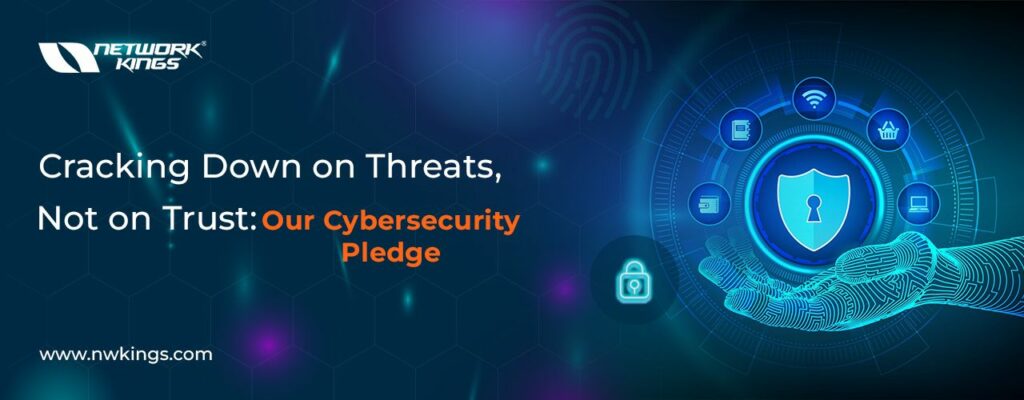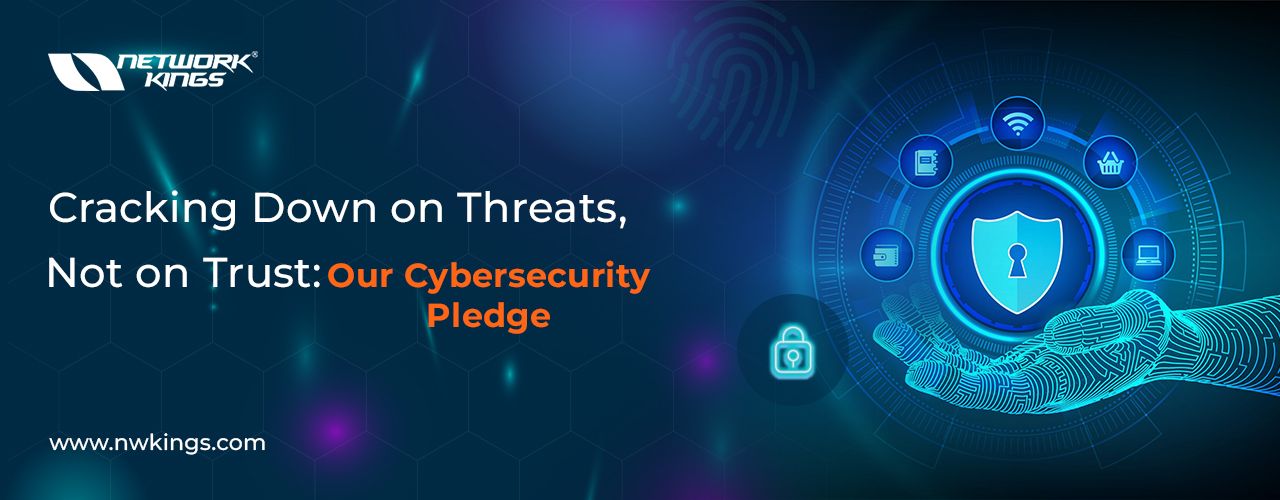
In today’s digital world, cybersecurity has become a critical concern for individuals, businesses, and government. The ever-increasing reliance on digital technology has made us vulnerable to cyber threats and attacks. However, by understanding the objectives of cyber security, we can take assertive measures to protect ourselves and ensure a secure digital environment.
In this blog post, we will delve into the main objectives of cyber security and explore how they contribute to safeguarding the digital world.
What is the importance of Cyber Security in IT?
The importance of Cyber Security in IT is as follows-
- Protects sensitive information and data from unauthorized access or theft
- Safeguards against cyber attacks, such as malware, viruses, and ransomware
- Ensures the integrity and confidentiality of digital systems and networks
- Prevents disruption of critical services and operations
- Reduces financial losses and reputational damage for businesses
- Helps comply with legal and regulatory requirements
- Promotes trust and confidence among customers and users
- Facilitates secure communication and collaboration within organizations
- Enables the safe adoption of emerging technologies, such as cloud computing and IoT
What are the objectives of Cyber Security?
The objectives of cyber security can be summarized as follows:
- Confidentiality of Data
- Integrity of Data and Information
- Data Availability
- Authentication
- Authorization
- Auditing and Monitoring
- Incident Response
- Non-repudiation
- Security Awareness and Training
- Compliance
- Continuous Improvement
What is Confidentiality of Data?
Confidentiality of Data is a fundamental objective of cyber security. It refers to the protection of sensitive information from unauthorized access, disclosure, or modification. This objective aims to ensure that only authorized individuals or entities can access and view confidential data. Encryption techniques, access controls, and secure communication protocols play a crucial role in achieving confidentiality.
What is the Integrity of Data and Information?
The objective of integrity of data and information in cybersecurity focuses on ensuring the accuracy and reliability of data throughout its lifecycle. It involves safeguarding data from unauthorized alterations, deletions, or additions. By maintaining data integrity, cybersecurity measures prevent unauthorized modifications that could compromise the trustworthiness or functionality of information systems. Techniques such as checksums, digital signatures, and data backups contribute to achieving data integrity.
What is Data Availability?
Data Availability is another primary objective in cybersecurity. It involves ensuring that information and resources are accessible to authorized users whenever needed. Cybersecurity measures aim to prevent disruptions caused by denial-of-service (DoS) attacks, system failures, or network outages. By implementing redundancy, backup systems, and disaster recovery plans, organizations can maintain the availability of critical resources and services.
What is Authentication?
Authentication is a vital cybersecurity objective that verifies the identity of users or entities attempting to access systems or data. It ensures that individuals are who they claim to be before granting them access privileges. Strong passwords, multi-factor authentication (MFA), and biometric authentication methods are some of the techniques used to achieve robust authentication. By implementing authentication mechanisms, organizations can significantly reduce the risk of unauthorized access and impersonation.
What is Authorization?
Authorization complements authentication by determining what actions or resources an authenticated user is allowed to access. This cybersecurity objective ensures that individuals or entities have the appropriate permissions to perform specific tasks within an organization’s systems or networks. Access control lists (ACLs), role-based access control (RBAC), and privilege escalation mechanisms are commonly used to enforce authorization policies. By implementing proper authorization measures, organizations can prevent unauthorized actions and limit potential damage caused by malicious actors.
What is Auditing and Monitoring?
Cybersecurity involves continuous monitoring and auditing of systems and networks to detect any suspicious activities or anomalies. Implementing intrusion detection systems (IDS), log analysis tools, and security information and event management (SIEM) systems helps organizations identify potential security breaches and take proactive measures to mitigate risks.
What is Incident Response?
Incident response is a proactive objective in cybersecurity that focuses on detecting, analyzing, and responding to security incidents promptly. It involves establishing incident response plans, implementing monitoring systems, and conducting regular vulnerability assessments. By having a well-defined incident response process in place, organizations can minimize the impact of security breaches and take immediate action to mitigate risks.
What is Non-repudiation?
Non-repudiation is a critical objective in cybersecurity, particularly in legal and financial contexts. It ensures that individuals cannot deny their involvement in a transaction or communication. By using digital signatures, audit logs, and timestamping mechanisms, non-repudiation guarantees the authenticity and integrity of messages or transactions. This objective plays a crucial role in legal proceedings, and fosters trust in electronic transactions.
What is Security Awareness and Training?
Security awareness is an often overlooked but vital objective of cyber security. It aims to educate individuals about potential cyber threats, best practices for safeguarding sensitive information, and how to respond effectively in case of a security incident. By promoting security awareness through training programs, workshops, and regular updates on emerging threats, organizations can empower their employees to become the first line of defence against cyber attacks.
What is Compliance?
Cybersecurity objectives also include ensuring compliance with relevant laws, regulations, and industry standards. Organizations need to adhere to privacy regulations, data protection laws, and security standards specific to their industry to avoid legal consequences and reputational damage.
What is Continuous Improvement?
Cybersecurity is an ever-evolving field due to the rapid advancement of technology and the emergence of new threats. Therefore, continuous improvement is an essential objective in ensuring effective cybersecurity practices. Organizations must regularly update their security policies, implement new technologies, and stay informed about the latest trends in cyber attacks. By embracing continuous improvement, organizations can adapt to changing threats and maintain robust cybersecurity measures over time.
What is the scope of cyber security in IT?
Cybersecurity has a vast scope in the field of IT. It involves protecting computer systems, networks, and data from unauthorized access, attacks, and damage. With the increasing reliance on technology, the demand for cybersecurity professionals is expected to grow.
NOTE: 5 Lakh Cybersecurity Engineer Jobs are still available!
Cybersecurity encompasses various domains such as network security, application security, information security, and cloud security. It offers diverse career opportunities, including roles like cybersecurity analyst, ethical hacker, security consultant, and cybersecurity manager.
As technology continues to advance, the scope of cybersecurity will continue to expand to counter emerging threats and protect digital assets.
How to begin a career in Cyber Security?
To begin a career in Cyber Security, you need to dwell on the top in-demand Cyber Security certifications, namely-
Where can I learn the best Cyber Security courses?
To learn the best Cyber Security courses, you need to enroll on Network Kings’ Cyber Security Master Program, comprising offensive and defensive certification programs, namely-
Offensive
- CompTIA Security+
- CEH
- CompTIA PenTest+
Defensive
- CompTIA Security+
- CompTIA CySA+
- CompTIA CASP+
What Cyber Security jobs are available in IT?
The top high-paying CyberSecurity job roles available in IT are as follows-
- Cyber Security Engineer
- Security Analyst
- Network Security Engineer
- Information Security Manager
- Security Architect
- Penetration Tester
- Incident Response Manager
- Cybersecurity Consultant
- Ethical Hacker
- Malware Analyst
- Cryptographer
- Forensic Analyst
- Security Operations Center (SOC) Analyst
- Cloud Security Engineer
- Identity and Access Management (IAM) Specialist
- Security Software Developer
- IoT Security Engineer
- Mobile Security Engineer
- Application Security Engineer
- Threat Intelligence Analyst
What is the salary package for a Cyber Security Engineer?
The estimated salary package for a CyberSecurity Engineer in 15 different countries is as follows-
- United States: USD 80,000 to USD 150,000 per year
- United Kingdom: GBP 35,000 to GBP 85,000 per year
- Canada: CAD 70,000 to CAD 130,000 per year
- Australia: AUD 80,000 to AUD 150,000 per year
- Germany: EUR 50,000 to EUR 100,000 per year
- France: EUR 45,000 to EUR 80,000 per year
- India: INR 500,000 to INR 1,200,000 per year
- Singapore: SGD 60,000 to SGD 130,000 per year
- United Arab Emirates: AED 150,000 to AED 320,000 per year
- Japan: JPY 6,000,000 to JPY 10,000,000 per year
- Brazil: BRL 80,000 to BRL 180,000 per year
- South Africa: ZAR 350,000 to ZAR 700,000 per year
- Mexico: MXN 400,000 to MXN 800,000 per year
- Saudi Arabia: SAR 120,000 to SAR 300,000 per year
- Switzerland: CHF 90,000 to CHF 150,000 per year
Wrapping Up!
As we navigate the digital landscape, understanding the objectives of cyber security becomes crucial for safeguarding our personal information, businesses, and critical infrastructures. By prioritizing these objectives and implementing appropriate measures we can collectively create a safer digital world for all.
Happy Learning!


